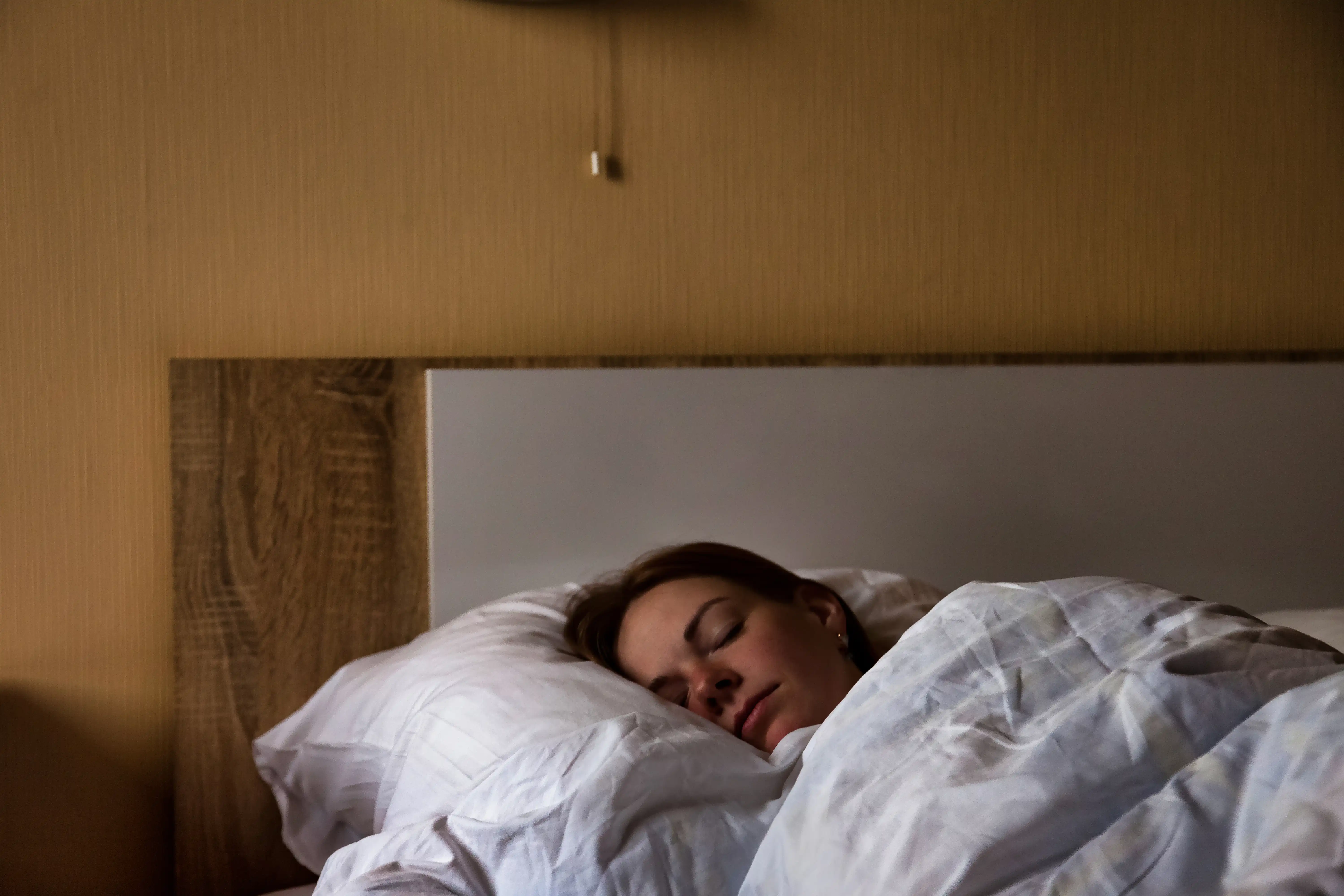Not all sleep stages are the same. While most of the night is spent in lighter sleep, slow-wave sleep is where your body and brain get the deepest rest. This stage is essential for recovery, memory processing, and waking up feeling truly refreshed. If you often feel groggy or unwell despite getting enough hours of sleep, a lack of slow-wave sleep might be the reason.
In this article, you'll learn what slow-wave sleep is, when it occurs during the night, and why it's so important for your overall health and well-being.
What Is Slow-Wave Sleep?

Slow-wave sleep (SWS), often referred to as deep sleep, is the third stage of non-REM sleep. It's characterized by slow brain waves known as delta waves, and it marks the most restorative period of the sleep cycle. During this stage, your brain activity slows down significantly, your muscles are fully relaxed, and your breathing and heart rate reach their lowest levels.
The body uses this time to repair tissues, build bone and muscle, and strengthen the immune system. It’s also the time when the brain consolidates memories and processes information gathered throughout the day.
When Does Slow-Wave Sleep Occur?
Slow-wave sleep typically begins within 30 to 45 minutes of falling asleep and occurs mostly during the first half of the night. It dominates the early sleep cycles, providing the deepest rest in the first few hours.
As the night goes on, slow-wave sleep gradually decreases, and REM sleep becomes more prominent. For most adults, slow-wave sleep accounts for around 13 to 23 percent of total sleep time, although this amount can vary based on age, health, and sleep quality.
Why Slow-Wave Sleep Is So Important

Slow-wave sleep is the most restorative stage of the sleep cycle. It’s when the body and brain slow down enough to focus on repair, recovery, and memory processing.
Without it, both your physical and mental functions start to decline, even if you’re getting the right amount of total sleep. Deep sleep is essential not just for feeling rested but also for staying healthy, emotionally balanced, and mentally sharp.
Physical Recovery and Growth
Slow-wave sleep is the body’s prime time for repair and rebuilding. It’s when muscles recover, tissues regenerate, and vital hormones are released to support growth and healing.
- Promotes Cell Regeneration And Tissue Repair: During slow-wave sleep, your body shifts into repair mode, working to heal muscles, tissues, and cells that have been stressed or damaged throughout the day. This process helps your body recover from physical activity, injury, or general wear and tear.
- Boosts Immune System Function: Deep sleep triggers immune responses that help fight off infections and inflammation. It gives your immune system the time and conditions it needs to work at its best.
- Increases Growth Hormone Release: Growth hormone levels peak during slow-wave sleep, especially in younger people. This hormone supports growth, cellular regeneration, and the maintenance of healthy body tissues.
Cognitive and Emotional Benefits
Slow-wave sleep doesn’t just restore the body; it also resets the brain. This stage plays a critical role in memory processing, emotional regulation, and even long-term brain health.
- Strengthens Long-Term Memory: While you're in deep sleep, the brain is busy transferring information from short-term storage to long-term memory. This is crucial for learning, studying, and retaining new skills.
- Helps Regulate Emotions: Slow-wave sleep allows the brain to rebalance emotional centers and stress-related hormones. It’s what enables you to wake up feeling more emotionally stable and resilient.
- Clears Waste From The Brain (Glymphatic System): During slow-wave sleep, the glymphatic system flushes out toxins and waste products that accumulate in the brain. This cleaning process may lower the risk of cognitive decline and neurodegenerative diseases over time.
Factors That Affect Slow-Wave Sleep

Slow-wave sleep doesn’t always happen automatically just because you’re asleep. Several internal and external factors can influence how much deep sleep you get each night.
Things like age, stress, sleep habits, and even what you eat or drink before bed can either support or disrupt this crucial stage. Understanding what affects slow-wave sleep can help you make smarter choices to improve both sleep quality and overall health.
Age
Age greatly affects how much slow-wave sleep you get. As we get older, sleep becomes lighter and more fragmented, with less deep restorative sleep. This natural change can leave many older adults feeling less rested, even if they spend enough time in bed.
Natural changes in the brain, especially in areas that produce slow-wave activity, reduce the ability to enter deep sleep. Older adults experience less delta wave activity, which is essential for maintaining slow-wave sleep. These changes lead to shorter and more disrupted deep sleep phases.
Getting plenty of daylight helps regulate your internal body clock, improving sleep timing and depth. Avoiding long or late naps prevents disruption of nighttime sleep pressure. Cognitive behavioral therapy for insomnia (CBT-I) can also help by changing habits and thoughts that interfere with deep sleep, improving overall sleep quality.
Lifestyle Factors
Certain daily habits and choices can have a big impact on how much deep sleep you get. Below are some key lifestyle influences.
- Sleep Deprivation Reduces SWS Over Time: Chronic lack of sleep gradually decreases the amount of slow-wave sleep you experience. Even if you catch up on rest later, repeated sleep loss can impair your ability to reach deep sleep stages consistently.
- Alcohol Can Suppress Deep Sleep: While alcohol may help you fall asleep faster, it disrupts your sleep cycle and reduces slow-wave sleep during the night. This leads to poorer quality rest and increased awakenings as the alcohol wears off.
- Physical Activity Can Increase SWS Duration: Regular exercise promotes longer and more intense slow-wave sleep. Physical activity helps the body recover by boosting the depth and restorative quality of sleep, especially when done earlier in the day.
Health Conditions and Medications
Many health problems and medications can interfere with deep sleep without you realizing it. Here are some common examples.
- Insomnia: People with insomnia often struggle to fall or stay asleep long enough to reach deep sleep stages. This results in less restorative sleep and increased daytime fatigue.
- Sleep Apnea: Sleep apnea causes repeated breathing interruptions that fragment sleep and reduce the time spent in slow-wave sleep. Treating apnea usually helps restore more normal deep sleep patterns.
- Depression: Depression can alter sleep architecture, often reducing slow-wave sleep and increasing lighter sleep stages. These changes contribute to the fatigue and cognitive difficulties common in depression.
- Antidepressants And Certain Stimulants: Some medications, including many antidepressants and stimulants, suppress slow-wave sleep as a side effect. Adjusting medication under medical supervision can sometimes improve sleep quality.
Signs You May Not Be Getting Enough Deep Sleep
Deep sleep is crucial for feeling rested and functioning well during the day. When you don’t get enough of it, your body and mind can send clear warning signals. Here are some common signs that your slow-wave sleep may be lacking:
Feeling Groggy Or Unrefreshed After Sleeping
Waking up tired or sluggish despite spending enough hours in bed is a common sign of insufficient deep sleep.
This stage of sleep is when your body performs most of its restoration work, repairing tissues, releasing hormones, and lowering heart rate. Without enough slow-wave sleep, your body doesn’t fully recover overnight, leaving you feeling exhausted and less energetic throughout the day.
Poor Memory or Concentration
Slow-wave sleep is essential for processing and consolidating memories. It helps transfer information from short-term to long-term storage, which supports learning and focus.
If you find it difficult to concentrate, remember details, or absorb new information, it may be because your brain hasn’t had enough deep sleep to properly organize and store those memories.
Weak Immune Response
Your immune system relies heavily on slow-wave sleep to function at its best. During deep sleep, the body produces proteins and cytokines that help fight infections and reduce inflammation.
A lack of adequate slow-wave sleep can lower your resistance to illnesses, making you more prone to catching colds or viruses or experiencing slower recovery from sickness.
Frequent Waking During The Night
Waking up repeatedly disrupts your sleep cycles and reduces the amount of time spent in restorative slow-wave sleep. These interruptions prevent your body from entering or maintaining deep sleep stages, leading to lighter, fragmented sleep. Over time, this can leave you feeling unrested, even if your total sleep duration seems sufficient.
Slow-Wave Sleep vs. REM Sleep: What’s the Difference?
When it comes to understanding sleep, two stages often stand out: slow-wave sleep (SWS) and REM sleep. Both are essential, but they serve very different purposes in the sleep cycle. Slow-wave sleep is known for deep physical restoration, while REM sleep is closely linked to dreaming and emotional processing.
The table below breaks down the main differences between these two crucial sleep stages to help you better understand their roles and how they affect your health.
| Feature | Slow-Wave Sleep | REM Sleep |
|---|---|---|
| Also Known As | Deep sleep, Stage 3 Non-REM Sleep | Rapid Eye Movement Sleep |
| Brain Activity | Slow, high-amplitude delta waves | Fast, low-amplitude mixed-frequency waves |
| Body Movement | Very minimal; muscles relaxed | Muscle atonia (almost paralyzed) |
| Eye Movement | Rare | Rapid, jerky eye movements |
| Dreaming | Rare or less vivid | Vivid and frequent dreaming |
| Function | Physical restoration, memory consolidation | Emotional regulation, memory processing |
| Heart Rate & Breathing | Slow and regular | Variable and irregular |
| When It Occurs | Mainly in the first half of the night | Mostly in the second half of the night |
| Duration | About 13–23% of total sleep | About 20–25% of total sleep |
Both slow-wave sleep and REM sleep are vital for overall health, each supporting different but complementary functions. While slow-wave sleep focuses on physical repair and memory consolidation, REM sleep plays a key role in emotional balance and cognitive processing.
Understanding these differences can help you appreciate the complexity of sleep and why maintaining a healthy sleep cycle is so important for your well-being.
How to Increase Slow-Wave Sleep Naturally
Improving slow-wave sleep can have a powerful impact on your overall health and daily energy. While some factors affecting deep sleep are out of your control, many natural habits and lifestyle changes can help you boost the amount and quality of this essential sleep stage.
By adopting consistent routines and making mindful choices, you can support your body’s ability to rest deeply and recover fully each night.
Healthy Sleep Habits
Building consistent and supportive sleep habits is the foundation for improving your deep sleep. Here are some simple but effective practices.
- Stick To A Regular Sleep Schedule: Going to bed and waking up at the same time every day helps regulate your body’s internal clock, making it easier to fall into deep sleep cycles naturally.
- Avoid Caffeine And Screens Before Bed: Caffeine is a stimulant that can delay sleep onset and reduce slow-wave sleep. Similarly, the blue light from screens suppresses melatonin production, interfering with your ability to fall asleep deeply.
- Keep Your Room Dark, Cool, and Quiet: A sleep-friendly environment encourages uninterrupted rest. Darkness signals your body to produce melatonin, cool temperatures promote comfort, and quiet surroundings prevent sleep disturbances that cut into deep sleep time.
Boosting SWS with Lifestyle Choices
Beyond sleep hygiene, certain lifestyle habits can actively increase your slow-wave sleep duration. Consider the following options to do so.
- Incorporate Moderate Daily Exercise: Regular physical activity boosts slow-wave sleep by helping the body expend energy and recover. Aim for moderate exercise earlier in the day to avoid stimulating your body close to bedtime.
- Try Relaxing Bedtime Routines: Activities like reading, gentle stretching, or taking a warm bath help calm your mind and body, making it easier to transition into deep sleep.
- Stress Management Techniques: Chronic stress can interfere with sleep quality and reduce deep sleep. Practices such as meditation, deep breathing, or mindfulness can lower stress levels and promote better slow-wave sleep.
FAQs
What Is Slow-Wave Sleep And Why Is It Important?
Slow-wave sleep is the deep sleep stage, vital for body repair, memory consolidation, and immune support. It helps you wake up refreshed and improves overall health by promoting physical and mental restoration.
How Can I Increase Slow-Wave Sleep Naturally?
You can increase slow-wave sleep by maintaining a regular sleep schedule, reducing caffeine and screen time before bed, exercising regularly, managing stress, and creating a dark, cool, quiet sleep environment.
How Much Slow-Wave Sleep Do Adults Need?
Adults typically spend about 13–23% of their total sleep in slow-wave sleep. This varies by age and health but is essential for recovery and brain function. Ensuring quality sleep helps maximize this deep sleep phase.
Can Stress Affect Slow-Wave Sleep?
Yes, chronic stress reduces slow-wave sleep by disrupting the body’s relaxation response. Managing stress through meditation, breathing exercises, or therapy can improve deep sleep quality and overall restfulness.
Does Exercise Improve Slow-Wave Sleep?
Regular moderate exercise boosts slow-wave sleep by increasing physical tiredness and promoting recovery. Exercise earlier in the day is best, as late workouts might interfere with falling asleep deeply.
Conclusion
Slow-wave sleep is crucial for physical recovery, memory, and emotional well-being. By understanding its importance and adopting natural strategies like healthy sleep habits and stress management, you can enhance your deep sleep quality. Prioritizing slow-wave sleep leads to better health and more energy every day.
Dom Abraham
As the lead content writer at Sleepiverse. Dom pours his heart into writing mattress reviews, bedding product reviews, and medically-reviewed health articles. Dom is from Portugal and likes to spend his free time writing on the beach as it gives him a sense of comfort. Aside from writing mattress reviews in front of the soothing beach view, Dom likes to experiment with new amazing food ideas.


